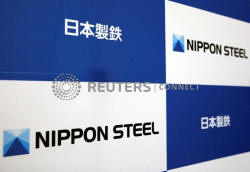|
With a planned capital expenditure budget of 1.7 trillion yen
($16 billion) during the period, the company could cut between
170 billion to 340 billion yen ($1.6 billion to $3.2 billion) in
spending.
Slowing global steel demand for automobiles and machinery
because of the trade row and higher materials costs have
battered Japanese steelmakers' quarterly earnings, forcing them
to cut their annual forecasts or give bleak guidance.
Earlier this month, Nippon Steel, Japan's top steelmaker,
reported a 33% drop in business profit for the April to June
quarter and predicted a 56% plunge in profit for the year
through March 2020.
The world's third-biggest steelmaker said at the time that it
would reduce planned capital expenditure and sell assets worth
200 billion yen in light of the slumping earnings and to
maintain financial health.
"We have already largely picked targets worth about a 10 percent
cut," Yuichiro Kaneko, head of the investor relations department
at Nippon Steel, told Reuters by phone.
Some planned spending on regular maintenance or upgrades for its
domestic plants will be delayed, while spending to bolster the
efficiency of some production facilities may be delayed as it
prioritizes repairs and upgrades on the facilities with higher
efficiency, he said.
Nippon Steel Executive Vice President Katsuhiro Miyamoto told
Reuters earlier this week that it aims to raise product prices
and boost productivity by streamlining its manufacturing
structure to help shore up faltering earnings.
Demand for flat steel used in automobiles and machinery is
slowing in China, prompting fears of an increase in regional
exports at a time when the broader Asian economy is stumbling
due to trade war, he told Reuters in an interview.
(Reporting by Yuka Obayashi; editing by Christian Schmollinger)
[© 2019 Thomson Reuters. All rights
reserved.] Copyright 2019 Reuters. All rights reserved. This material may not be published,
broadcast, rewritten or redistributed.
Thompson Reuters is solely responsible for this content.

|
|





